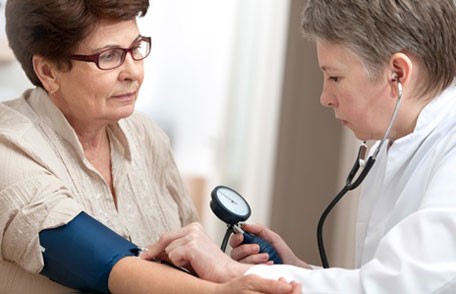ACTSI Investigators Find that Arterial Stiffness may Predict Cognitive Decline in Healthy Adults

In a study published in the journal Hypertension, Atlanta Clinical & Translational Science Institute (ACTSI) investigators found that arterial stiffness (the hardening of the blood vessels that carry blood from the heart to rest of the body), may be superior to blood pressure in predicting cognitive decline (the gradual loss of certain aspects of brain function including thought, reasoning, and memory).
Previous reports on the association between blood pressure and cognitive function were mixed, despite strong evidence for a link between hypertension (high blood pressure) and cognitive decline. This study, led by Ihab Hajjar, MD, associate professor of medicine and neurology, Emory University School of Medicine, and colleagues at Emory University School of Medicine, Felicia Goldstein, PhD, professor of neurology, Greg Martin, MD, professor of medicine, and Arshed Quyyumi, MD, professor of medicine, aimed to disentangle the clinical characteristics of hypertension and determine whether arterial stiffness that may accompany hypertension better predicted cognitive decline than elevated blood pressure. To carry out this research, the authors used data from the Emory Center for Health Discovery and Wellbeing (CHDWB) cohort. The CHDWB is part of the Predictive Health Institute of Emory University and Georgia Tech, housed in the Georgia CTSA Clinical Research Centers (GCRCs) Clinical Research Site at Emory University Hospital, and aims to prevent chronic diseases through the development and maintenance of healthy lifestyles. The CHDWB was established in 2008 using a health partner model to provide personalized interventions through counseling and knowledge promotion. Participants are generally healthy employees of Emory University (approximately 750 participants are enrolled to date) who have undergone a battery of tests including physical examinations and physiological tests, blood draws for biochemical measurements, and psychological and lifestyle questionnaires to characterize their health status. Based on the results of their baseline profile, participants are matched with a health partner to provide counseling for a personalized approach to help participants reach their goals for a healthier lifestyle. Participants are evaluated again at six months, 12 months, and yearly thereafter.
For this study, 591 participants had baseline vascular and cognitive function tests and were followed-up at one year and at least once more two to four years later. Arterial stiffness was measured by pulse wave velocity (PWV) and cognitive function was evaluated using common neuropsychological measures from which cognitive function scores were derived. The investigators found that higher PWV was associated with a greater decline in multiple cognitive domains, including executive function score, working memory, and memory score, whereas blood pressure was generally not associated with changes in cognitive function scores. Those with hypertension and elevated PWV experienced the greatest decrease in executive function score. “The implication of this work is that central arterial stiffness may be a better marker of cognitive decline with aging than blood pressure level,” said Hajjar.
This work was supported by Emory University and the National Institutes of Health, and the investigators utilized the resources of GCRCs where the data was collected for the CHDWB cohort. “To increase the value of initial investments from Emory University and to ensure long-term success, ACTSI provides support for managing the CHDWB cohort with space, staff, and resources to conduct the longitudinal study,” said co-author, and ACTSI co-PI and director of GCRCs, Greg Martin, MD. As noted above, the current analysis was based on data collected as part of the CHDWB, which may lend itself to various investigations of factors related to disease. “Investigators may utilize these data to look at factors that predict aging related changes and diseases,” suggested Hajjar.
The Predictive Health Institute and ACTSI have an ongoing call for research proposals to use data and/or specimens from the CHDWB cohort which are available to all Emory, Morehouse School of Medicine (MSM), and Georgia Institute of Technology (Georgia Tech) researchers.
The Georgia CTSA Clinical Research Centers (GCRCs) is a multilayered, flexible, and geographically distributed network created to meet the needs of translational and clinical investigators from Emory, MSM, and Georgia Tech. The GCRCs includes nearly 35 clinical research sites across the city incorporating hospital, medical office, and community-based clinical research sites, such as Emory University Hospital, Emory Midtown Hospital, Grady Memorial Hospital, Children’s Health Care of Atlanta, the Ponce Infectious Diseases Clinic, the Hope Clinic, Wesley Woods Health Center, and the Morehouse School of Medicine Clinical Research Center.
The ACTSI is a city-wide partnership between Emory, MSM, and Georgia Tech and is one of over 60 in a national consortium striving to improve the way biomedical research is conducted across the country. The consortium, funded through the National Center for Advancing Translational Sciences (NCATS) and the National Institutes of Health’s Clinical and Translational Science Awards, shares a common vision to translate laboratory discoveries into treatments for patients, engage communities in clinical research efforts, and train the next generation of clinical investigators.